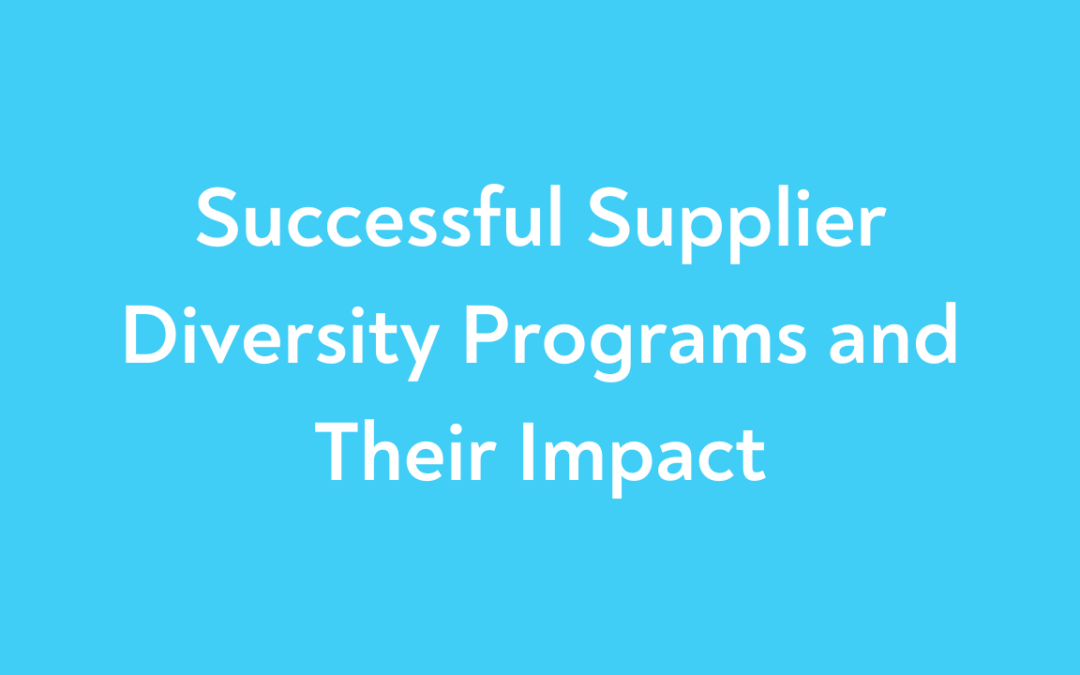Supplier diversity programs have evolved from a corporate social responsibility initiative to a strategic business imperative. Companies that are successful in implementing these programs have witnessed significant benefits, including enhanced innovation, improved market reach, and a boost to their brand reputation. This article highlights a few examples of corporations that have successfully implemented supplier diversity programs and the transformative impact they have had on communities and the economy.
IBM:
IBM has a long-standing commitment to supplier diversity. Since launching their program in 1968, the tech giant has spent over $3 billion annually with diverse suppliers. IBM’s supplier diversity program has created jobs, spurred innovation, and fostered economic development in marginalized communities. By investing in these communities, IBM has not only fulfilled its social responsibility but also tapped into unique perspectives and talents, driving creativity and innovation within the company.
The Coca-Cola Company:
Coca-Cola has a robust supplier diversity program that has a global impact. They spent $500 million with diverse suppliers in 2020 alone and aim to increase that figure significantly by 2025. Coca-Cola’s commitment to supplier diversity has enhanced their understanding of diverse markets, giving them a competitive edge in the global marketplace. By building relationships with diverse suppliers, they have also stimulated economic growth in various communities, creating job opportunities, and fueling local economies.
Johnson & Johnson:
Healthcare giant Johnson & Johnson has a dynamic supplier diversity program. In 2019, the company spent over $1 billion with diverse suppliers. Johnson & Johnson’s program not only focuses on engaging diverse suppliers but also developing them through mentorship programs and business seminars. This initiative has significantly impacted communities by fostering entrepreneurial growth and offering new career opportunities.
Procter & Gamble:
Procter & Gamble’s supplier diversity program has seen them spend billions with diverse suppliers since the founding of their supplier diversity operations in 1976. Their commitment to diversity extends beyond spending, with the company providing resources and support to help diverse suppliers grow.
Walmart:
Walmart’s supplier diversity program focuses on providing opportunities to diverse businesses. The retail giant spent over $13 billion with diverse suppliers in 2019, and has a clear vision of how they aim to facilitate local and global sourcing practices. Some of these initiatives include:
- U.S. Manufacturing: Make transformative investments to strengthen American manufacturing, support small businesses, create new jobs, and provide more value to Walmart’s customers and communities.
- Supplier Inclusion: Source from and build the capacity of diverse suppliers, including suppliers owned and/or operated by women and people of color.
- Make in India: Triple exports of goods from India to $10 billion per year by the end of 2027, building on the success of the Vriddhi program Walmart launched in 2019.
- Market Access for Smallholder Farmers and Small Producers: In Central America, India, and Mexico, source directly from smallholders and/or small producers and invest through philanthropy in facilitating market access and building capacity of smallholders across the sector.
Walmart’s commitment to supplier diversity and supply chain inclusion has led to mass job creation and huge economic growth in various communities.
Ford Motor Company:
Ford has a long-standing commitment to supplier diversity and has been recognized multiple times for its excellence in this area. The automaker spent $5.8 billion with minority-owned suppliers in 2020 alone, including businesses owned and operated by ethnic minorities, veterans, members of the LGBQTIA+ community, disabled people, and women. Ford’s supplier diversity program focuses not just on procurement but also on the development of diverse suppliers through training and mentorship programs. This investment in diversity has resulted in job creation and community development, particularly in regions where Ford operates.
Starbucks:
Starbucks has integrated supplier diversity into its core business strategy. Their commitment to diversity extends beyond just the suppliers they work with, as they strive to create a culture of inclusivity throughout their entire supply chain. In their daily practices, Starbucks has made a concerted effort to develop and maintain an inclusive supply chain. In their latest inclusion report, Starbucks announced that they are committed to spending $1.5 billion annually with diverse suppliers by 2030. In FY22, $882 million had been spent with diverse suppliers. Starbucks’ supplier diversity initiatives have not only enhanced their product offerings but also significantly contributed to local economies and job creation.
Microsoft:
As a global tech leader, Microsoft has made supplier diversity a cornerstone of their procurement strategy. Microsoft spent $2.9 billion on procurement from diverse suppliers in 2019. This engagement with diverse suppliers has fueled innovation, opened new markets, and strengthened their global supply chain. By investing in diverse suppliers, Microsoft is contributing to job creation and economic growth in various communities around the world.
These successful supplier diversity programs demonstrate that diversity is more than just a CSR initiative; it’s a critical driver of innovation, economic growth, and community development. While all of these companies have committed to increasing their spend with diverse suppliers, they all have recognized that the job doesn’t end there. By offering mentorship programs and making a concerted effort to train diverse suppliers on how to improve their business operations, these corporations are actively contributing to the betterment and development of supplier diversity as a whole.
Key Takeaways:
- Successful supplier diversity programs can drive innovation, enhance market reach, and improve brand reputation.
- Companies like IBM, Coca-Cola, Johnson & Johnson, Procter & Gamble, Walmart, and more have demonstrated the significant impact of supplier diversity programs on communities and the economy.
- Supplier diversity programs are a critical driver of economic growth and development in underrepresented communities.
- By supporting diverse suppliers, companies are not only enriching their own businesses but also helping to build an inclusive and equitable business landscape.
- Hire Ground is committed to fostering this inclusivity, providing the tools and resources necessary to create successful supplier diversity programs.


Recent Comments